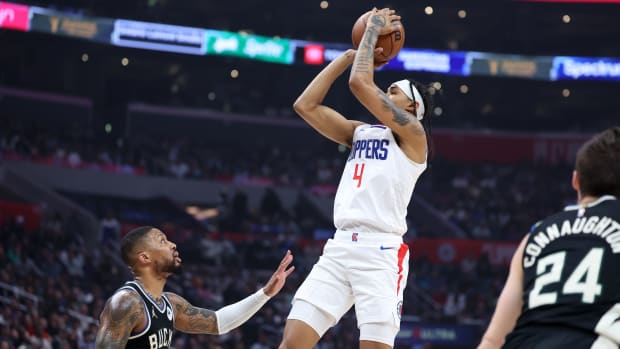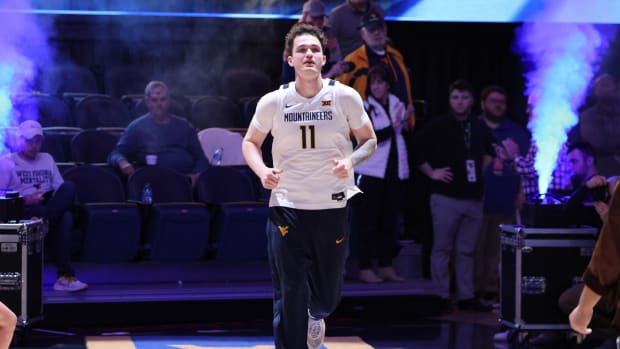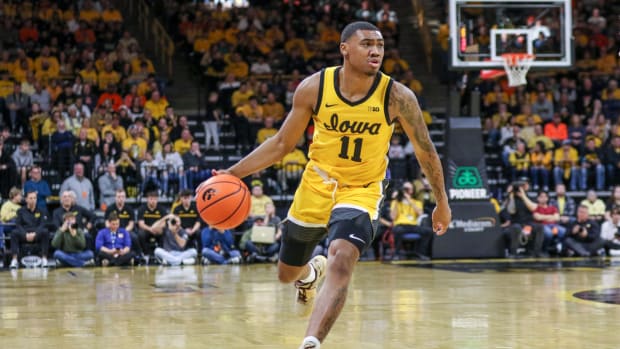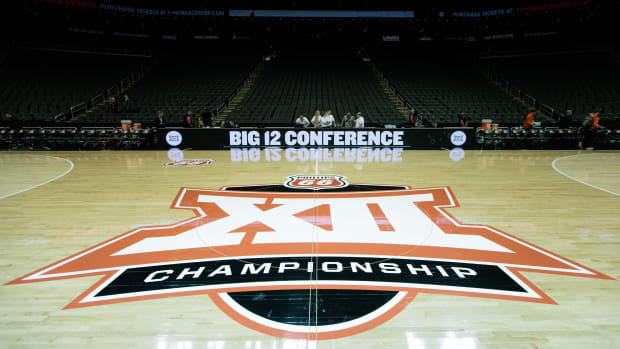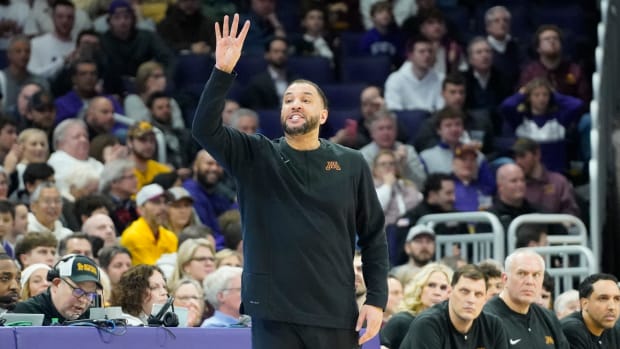Dick Kelley gave his heart to BC; now the school is giving back
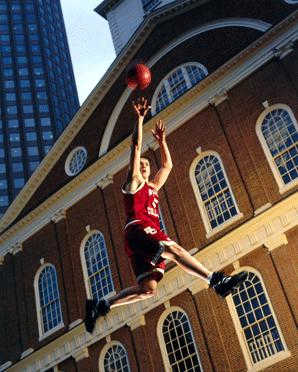
Boston College basketball SID Dick Kelley (center) was honored with the US Basketball Writers' Courage Award prior to an Eagles game in March.
John Quackenbos/BC Media Relations/
CHESTNUT HILL, Mass. -- Nearly 15 years after Chris Herren flamed out of Boston College, having compiled more failed drug tests than games played, he finally celebrated a year of sobriety. One of his first calls that day in 2009 was to Dick Kelley, Boston College's longtime assistant athletic director for media relations.
"He was the guy calling me into his office when I was struggling on campus and failing drug tests to find out why," Herren said.
Atlanta Falcons quarterback Matt Ryan emerged as a superstar at Boston College in 2007, and he's most grateful that Kelley never handled him like one. Kelley always talked politics, academics and BC history with Ryan, treating one of BC's elite athletes the same as a student intern.
"The thing I loved about working with him was that he didn't sugar coat anything," Ryan said. "His big line all the time my last year was, 'You're a Boston College graduate, why don't you sound like it once in a while?'"
From Howard Eisley to Jared Dudley and Tom Coughlin to Chris Kreider, Kelley has spanned the generations, sports and personalities of Boston College as a trusted confidant and staunch advocate. And since he began working in the media relations department as a BC freshman in 1983, his disarming sarcasm, brutal honesty and acerbic wit have made him one of the most vibrant and enduring characters on campus.
In the spring of 2011, Kelley began struggling to grip a pencil. BC's trainers couldn't help, and after a trip to the doctor, Kelley walked into the office of media relations colleague Tim Clark and told him, "They haven't ruled out ALS." Kelley quickly left Clark's office in tears.
That September, doctors diagnosed Kelley with ALS, commonly known as Lou Gehrig's disease. ALS is a vicious and relentless disease that attacks the nerve cells and robs the body of voluntary muscle movement. There is no cure and the average life expectancy is two to five years.
In about a year-and-a-half, Kelley has lost the use of his arms and legs and can barely speak. He requires around-the-clock care, communicates mostly through e-mail via a piece of reflective foil between his glasses, and gets around in a specialized wheelchair.
The raw outpouring of emotion and support that has followed his diagnosis has shown both how much Dick Kelley means to Boston College and how much Boston College means to Dick Kelley.
Kelley, 48, rarely took vacation, never married and relished being the first one in the office every morning. After his diagnosis, he never gave a second thought to retiring. And BC never thought about stopping him from working. Kelley attended most BC basketball practices and all but one home game in a wheelchair this season.
"BC has been the passion of his life, an intense love affair that he has for this place and its mission and for the people here," said Chris Cameron, BC's director of media relations and a longtime friend of Kelley's. "And, you know, I guess I think he just tried to give back as much as he'd gotten from this place."
VIDEO: Watch a tribute to Dick Kelley
BC provided Kelley housing close to campus, and everyone from the school's head coaches to maintenance workers have chipped in to give him rides and carry him up stairs. Kelley's colleagues in media relations helped the most, including on trips to the restroom.
"Dooooon't peeeeek," Kelley would joke, his wit shining as his body failed him.
"They have been his life," said Ann Kelley, Dick's mother, "and cared about him in ways that I could never imagine."
Kelley transcended the rudimentary tasks of his job -- arranging interviews and preparing game notes. He'd encourage athletes to register to vote, proofread their papers and serve as their de facto therapist. (Kelley still proofreads the papers of Baylor guard Brady Heslip, who transferred there from BC nearly three years ago.)
Kelley's legacy can been seen in the depth and breadth of his relationships over the course of four decades in BC's Sports Information Department. Kelley served as everything from a confidant to stars like Ryan, Herren and Dudley to a confirmation sponsor to basketball walk-on Tyler Neville.
"Most SIDs are worried about the interview, he's more worried about the kid behind that interview," Herren said. "He's just a beautiful soul. Always was and always will be. No matter what."
*****
Thunderous applause rained down from the stands at Conte Forum before Boston College's game against Virginia on March 3 soon after Kelley wheeled to mid-court to receive the US Basketball Writers Association's Courage Award.
Boston College rescheduled the ceremony to pre-game from halftime after the BC players insisted on being out on the floor with Kelley. Moments before tip-off, surrounded by the team and coaches, the crowd stood in unison as Kelley's image flashed on the video screen.
Longtime BC observers rank the 90-second standing ovation among the longest in the history of Conte Forum. Kelley's eyes welled up. Strangers in the crowd began to cry. Tears streamed down the face of BC assistant coach Nat Graham. Each BC player approached Kelley and told him, clear and firmly, that they loved him.
The game officials saluted Kelley, and every member of press row stood and applauded heartily. During every timeout, a former player, intern or classmate of Kelley's stopped by to say hello or introduce him to their toddler.
"Surrounded by loving people who mean so much to me while receiving a much-more-than-I-deserved ovation from the crowd was overwhelming," Kelley said.
For Kelley, a contrarian who follows the Oakland A's in Red Sox country and attended church every day except Sunday, the moment proved fitting.
"Dick for so many years had helped people and showed them love," said Bobby Bonanno, one of Kelley's close friends who handed out statistics at BC games for decades. "And this was a way for other people to show their love back."
For 35 minutes, the game didn't match the energy and verve of the pregame ceremony. BC trailed by eight points with 4:30 remaining, a daunting deficit against defensive-minded Virginia. But in a dramatic flurry that awoke the crowd and stunned everyone, the Eagles pulled off a shocking 53-52 victory. Freshman guard Joe Rahon swished a three-pointer from the left wing in the waning seconds, 15 feet in front of Kelley's wheelchair on press row.
Moments after the game, Rahon stood a few feet in front of Kelley's wheelchair and locked eyes with him.
"That shot was for you, DK," Rahon said. He then walked around press row, leaned over, gave Kelley's frail body a gentle embrace and told him that he loved him.
One by one, each of Rahon's BC teammates came by with an emotional message:
"We love you, DK."
"We won for you, DK."
"Today was for you, DK."
Kelley's eyes welled with emotion, saying everything his voice couldn't.
"I cannot adequately express in words what that postgame gesture meant to me," Kelley said.
BC coach Steve Donahue followed his players over to press row, grabbed Kelley gently on the arm and shared the moment with him. In his postgame press conference, Donahue broke down in tears while talking about Kelley.
"This is his life -- Boston College and Boston College basketball," Donahue said later. "He's a guy who wants to help BC, there's no ulterior motive. It's pure love."
*****
When Kelley returned to work the day of his diagnosis in September 2011, he called co-workers Clark, Cameron and longtime office secretary Steff O'Leary into his office. No words were needed. Kelley's crying confirmed the diagnosis they'd all feared.
The only thing that's come close to matching the emotion of the devastation from Kelley's diagnosis has been the outpouring of support from the Boston College community. The day Kelley learned the news, BC President Father William P. Leahy visited Kelley in his office and promised that BC would do whatever it could to support him. Prominent BC alum Jack Connors, with whom Kelley attended daily mass, arranged an appointment with one of Boston's top neurologists, Dr. Martin Samuels, for the next day at 10 a.m. That appointment led to his current care under Dr. Merit Cudkowicz, who Kelley calls "brilliant" and her team "incredible," at the ALS Clinic at Mass General Hospital.
"I am absolutely receiving the best care," Kelley said, "just as Mr. Connors promised."
As Kelley's condition deteriorated, he went from walking to a scooter to a wheelchair. With every step, someone at BC provided help. Kelley, an avid runner whose biggest vice was a daily bowl of coffee ice cream, found an exercise bike set up in his condo when running became difficult. The bike came courtesy Leo Sullivan, BC's vice president of human resources. When Kelley needed to give up driving, Sullivan provided him with a 24-hour taxi service, with BC picking up the tab and tip.
Every morning, Kelley got breakfast -- medium regular Dunkin Donuts coffee and sausage egg and cheese on a plain bagel -- delivered by the coach with the most wins in college hockey history, Jerry York. Kelley, in his vintage sense of humor, teased York for being his "Meals on Wheels" when he'd deliver chicken parmesan from Porcini's in Watertown on Friday nights.
Around the BC athletic department, so many people offered their help, time and support that Cameron said he practically need a full-time employee to manage the outpouring. "I don't think this is going on at Exxon," Cameron said.
BC's biggest gesture came in providing Kelley a handicap accessible apartment just a few Doug Flutie heaves from the edge of campus. BC workers completely overhauled it, installing carpet more suitable for a wheelchair and gutting the bathroom to make it handicap accessible.
"I don't think there's a plumber or carpenter left on campus because they're all down at Dick's," Cameron said one afternoon.
"I've never been more proud of my alma mater," said Ed McLaughlin, the VCU athletic director who knew Kelley from his days as the sports editor of BC's school paper. "It showed how much he's meant to the place and how much people mean to BC. It warmed my heart to see them take care of someone who took care of BC for so long."
*****
Former BC baseball player Pete Frates, now the team's Director of Baseball Operations, was diagnosed with ALS not long after Kelley. Frates has told BC baseball coach Mike Gambino, a former student worker for Kelley and a frequent visitor, that ALS is comparable to being "buried alive."
One of the paradoxical parts of ALS is that the mind stays sharp as the body erodes. For Kelley, all those quick quips, sarcastic barbs and sharp political debates are still there, just much more difficult to articulate.
Thanks to a silver dot located on the wire between his glasses -- and the help of a BC graduate -- Kelley can still communicate. The dot is a piece of reflective foil that allows Kelley to use a specialized computer that rests a few feet in front of him. Former BC trainer Stephen "Sid" Basiel, a close friend of Kelley's now working at Vermont, calls the device Kelley's "Stephen Hawking screen."
Atop the computer screen is a camera-like box that projects an invisible beam onto the foil, allowing the dot to reflect a cursor on the screen that Kelley can maneuver by moving his head. Kelley can change the channel on his big-screen television, switch off the lights and type out words to exchange e-mails. For this article, Kelley provided lengthy e-mail responses; his answers to the first five questions totaled 1,420 words.
Kelley frequently tweets as a way to trade messages with BC coaches and players, both current and former. For a few weeks this year, Donahue and BC video coordinator Dan McDermott couldn't figure how Kelley could e-mail them media requests when his movement was so limited.
"I think it comes back to the device; that's been a saving grace to keep him in communication with people," said Ted Kelley, Dick's older brother.
On a recent afternoon, Kelley sat on his couch wearing a white Boston College polo shirt and grey warm-up pants and flashed a wide smile when a familiar reporter walked in. Kelley still has limited verbal communication, as words like "Steve Donahue" and "BC" were audible. Others were harder to decipher, as when a reporter asked Kelley how he clicks to choose a letter on his machine, he spelled out the word H-O-V-E-R-I-N-G. By keeping the cursor atop a letter long enough, the laser eventually clicks it like a mouse.
Kelley rarely has to type out an entire word, as there are options readily available for common words -- there, is, that. When a few letters are typed, the device offers quick key options like many smartphones do.
When Ed Kelley arrives every morning to look after his son, there's typically an itinerary that Dick has typed out, including medicines he needs. "That's his lifeline," Ann Kelley said.
Dick Kelley admits communicating this way can be "frustratingly slow," especially compared to his preferred rapid-fire wit. But he's beyond grateful for the help of John Costello, the Director of the Augmentative Communication Program at Boston Children's Hospital. Costello, BC class of 1983, said he'd love to be able to help cure ALS, but until that happens he relishes improving the quality of life of patients enduring it.
"What is possible," Costello said, "is to make a difference by supporting people to have the best quality of life possible."
Kelley said his emotions have varied since his diagnosis, as he admits sadness "creeps in" when he can't do things he used to, both personally and professionally. "I have my highs and lows. Doesn't everyone?" he said. "Though many, many more of the former."
Kelley, the consummate communicator for so many years, is grateful he can continue to do so. Streams of visitors come in and out of his apartment, from BC basketball stars of the 1990s, like his close friend Marc Molinsky, to members of the current team who will drop by on a Sunday afternoon or for a catered dinner.
Kelley can respond to e-mails and texts now thanks to Costello. To thank him, Kelley bought Costello -- what else? -- a Boston College sweatshirt.
"I have many moments of joy and happiness," Kelley said. "I get great joy spending time with family and friends. I get much happiness spending time with the basketball team -- interacting with them, and watching them practice and play. It is a remarkable group. I get joy from the emails, texts and cards I receive from so many people."
*****
From 1983 to present, Kelley only spent two years away from BC. After getting his master's degree from BC in 1989, Kelley worked at Boston University. He spent one of those seasons at BU working with basketball coach Mike Jarvis, who recalls the personal touches more than the professional details.
Kelley took Jarvis's son, Deuce, to get his driver's license. And after Mike Jarvis left to coach George Washington, Kelley looked after Deuce's use of a 1985 Dodge known affectionately as the "Family Tank."
More importantly, when the new coaching staff attempted to make Deuce Jarvis, then a BU player, uncomfortable, Kelley provided guidance and friendship.
"When Dick goes home to be with the Lord, we're going to find out so many more things," Mike Jarvis said. "There was a light that not only was shining and still shines but will always shine for anyone who knew Dick. Dick will never die. He planted a lot of positive seeds."
Kelley is the son of Ed and Ann, a pair of teachers who have a combined 66 years of experience. And when Dick Kelley returned to BC soon after the first game of Coughlin's tenure in 1991, he never left. Kelley didn't seek a promotion, as staff meetings and dealing with budgets weren't as appealing as building relationships with athletes. Another job outside BC was never considered. For years his license plate -- BC 8789 -- showcased both his graduation years and final destination.
No one appreciated Kelley's dedication more than the BC athletes. Ryan Anderson, one of BC basketball's current stars, recalled being invited into Kelley's office soon after he arrived on campus from California. Kelley grilled him about his family and academic goals more than anything on the court.
"I don't think I can pick one person who has affected me more since I've been at BC than DK," he said.
Kelley didn't only befriend BC's stars. He always went out of his way to introduce himself to the managers, and some of his closest relationships were with the walk-ons. He wrote a letter of recommendation to graduate school for Adam DeMong, a 2003 BC graduate who walked onto the basketball team. When another walk-on, Tyler Neville, decided to get confirmed while in college he choose Kelley without hesitation as his sponsor.
"He didn't have a hierarchy," DeMong said. "He treated me the same as he treated Troy Bell."
As for the technical part of Kelley's job, dealing with the media and training kids for interviews, few are better. Former BC radio broadcaster Ted Sarandis recalled Kelley never having a bad day.
"He's one of the most pleasant human beings I've never dealt with," said Bob Ryan, the longtime Boston Globe colummist and a 1968 BC graduate. "You couldn't be a better ambassador than he's been. My mind can't even wrap around the concept of someone not liking him."
Dudley, now a star with the Phoenix Suns, showed up at Boston College with little media experience and talked a mile per minute. He left a polished team captain, thoughtful spokesman and with enough confidence to emerge as one of the NBA's most media savvy players. (This hilarious video on Dudley's "athletic hands" showcases that perfectly.)
Dudley heard Kelley's timeless pre-interview advice to BC athletes -- "positive and humble" -- so much that he shortened it to "P and H." Kelley's lessons still resonate, as Dudley said he that never blames anything on the media, always talks after losses and speaks slowly and clearly.
Dudley came to BC with a strong interest in the media and recalls going to Kelley's office every other week to engage with him about getting exposure. "He took care of me," Dudley said. "Dick Kelley is definitely one of those people that make BC what it is."
Now that Matt Ryan faces waves of media in the NFL every week, he appreciates the training that Kelley and Cameron gave him. Ryan laughs when recalling Kelley critiquing his interview videos during BC training camp.
"He had a good way of calling you out in the right way," Ryan said. "Like, 'Good message, but your delivery was terrible. You're using too many fillers.'"
Ryan says his favorite moments with Kelley were when he'd close the door to his office, and they'd chat about politics, gossip about BC athletics and Ryan would pick Kelley's brain about former BC quarterbacks.
"He treated you like the person you were, not what you were doing on the field," Ryan said. "He treated you kind of normally. That goes along way. It was like he was a friend as opposed to the SID setting up the interviews."
*****
Dick Kelley's 7-year old nephew, Ryan, may have best encapsulated the dual support networks that have emerged since Kelley's diagnosis. "I love uncle Richard," Ryan Kelley said. "I'm glad he owns BC, but I wish that he owned the Patriots too."
Kelley doesn't quite own BC, but he's forged such strong relationships there that two distinct support systems have emerged since his diagnosis.
Ed Kelley, 77, drives about 40 minutes from Andover to his son's apartment in Brighton every day at 10 a.m. to look after him. He leaves around 8, sometimes with tears streaming down his face so hard on the ride home that he has to pull over for a few minutes.
"My father has devoted every minute of every day to my brother," Ted Kelley said. "I have two young kids, I wish I could be half the parent that both my parents are."
Kelley's nieces, Emma (9) and Meghan (5), and nephews, Micky (17) and Ryan (7) are weekly visitors. Their hand-drawn Easter cards and framed pictures brighten his apartment. Kelley's two brothers, Pat and Ted, are constantly around and checking in. Ted's wife, Carrie, has emerged as the organizational hub, calling for appointments, scheduling caregivers and staying on top of the endless details.
"You better keep her," Ed Kelley said he jokes with his son Ted about Carrie. "Or she's in, and you're out."
Teaching responsibility to the very end, Dick Kelley will have Micky handle his feeding tube and write out his checks for his bills.
"Thank God we are a close family," said Ann Kelley, who visits frequently, "because it takes a village."
Kelley was raised with a love for education and sports. Ed Kelley also served as an assistant basketball coach at Andover High and three local colleges, exposing Dick and his brothers to gyms when they were in diapers. (Ted played at BC and served as a co-captain on Jim O'Brien's first team as a redshirt senior in 1986-87.)
Dick Kelley set the goal in junior high of attending Boston College and working in sports journalism. He found exactly what he wanted at BC, an elite education and a fulfilling life, and attempted to give back to the school a measure of what it gave him.
*****
In the Boston College media relations office these days, the silence is deafening. Every couple minutes, the water cooler gurgles to life, and the bubbling sound reminds everyone how quiet it really is.
For years, Kelley and secretary Steff O'Leary drowned out the water cooler. They'd blast a YouTube of Fleetwood Mac's "Don't Stop Thinking About Tomorrow," featuring the USC marching band, when they needed a pick-me-up.
When students showed up to interview for positions, Kelley so enjoyed needling them about their politics, hometowns and lack of qualifications that he'd leave the door open so O'Leary could laugh along. Those who bantered back typically got the gig, although it helped if they embodied two of Kelley's prized traits -- writing lefty and leaning that way politically. (He has a "Lefties Rule" ruler in his desk drawer.)
Kelley would poke fun at O'Leary every time she'd show up late or try to sneak out a few minutes before five. She'd fire right back at him, occasionally forcing Cameron to slam his door so he could concentrate.
O'Leary retired last year, and Cameron can only shake his head at the silence. "I'd give anything if my biggest problem now was Steff and Dick being too loud," he said in the quiet of his office. "I'd give anything for one of those days again."
Media relations isn't a glamorous or lucrative life, as it's filled with working weekends, late nights and the fickle whims of both coaches and the media. The crew at BC became so close that they tagged along to scout when another bought a home or condo, and O'Leary and Cameron picked out all of Kelley's interior decorations online in the office.
"Those people lived their jobs seven days a week," O'Leary said. "You spend more time with them than you do your own family. I feel like Dick is my brother, I was with him every day of my life for 18 years."
Kelley is such a grammar freak that he'd hand out sheets to the student workers outlining the difference between "your" and "you're" and "its" and "it's." Gambino, the baseball coach, recalls working for Kelley one summer as a student and getting lectured on being inconsistent with spacing between sentences.
Cameron would text Kelley if there was a spelling mistake in a graphic on the 11 p.m. news. And god help the person in the marketing department who made a grammar mistake on the scoreboard at a BC game.
Cameron said he and Kelley would trade picture texts about pet peeves -- green bananas in the grocery store or restaurants that only had brown mustard. When Cameron returned to his native Kentucky one summer, he texted Kelley a picture of yellow mustard and Kelley quickly replied, "There's no place like home."
These days, home is the most fitting place -- on the edge of the BC campus. McDermott, who Kelley once hired in media relations before he became video coordinator, points out how unusual, yet perfect, it is for Kelley to get a terminal diagnosis yet choose to move closer to his work.
But for Kelley, he really just ended up moving closer to home.
"I am blessed," he said. "I cannot imagine taking on this disease without a strong support network. I am grateful for all that I have and all that I have been given, and I'm not talking about material things. I have a great, loving family -- my parents, two brothers, a sister-in-law and four incredible nieces and nephews. I have remarkably loyal friends. My Boston College family continues to amaze me with its generosity, love and support. I am blessed to have great faith.
"I know I am never alone."
To donate money to help defray the costs of Dick Kelley's care, go here.

